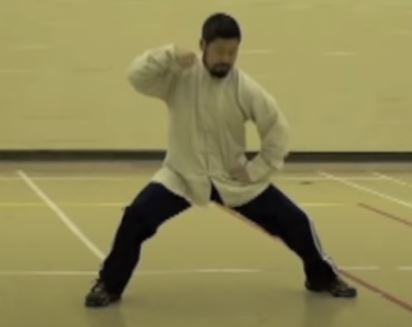“When I was practicing tai chi on the campus in the morning, someone said ‘hello’ to me and I found out he was my professor. He asked whether he could learn tai chi from me and I said ‘of course’,” Chen says.
He went on to accept more than 60 tai chi followers, mostly professors and staff members of the university, beginning his lifelong journey to help promote Chinese culture.
Class act
Chen suffered from various illnesses during his childhood, making him frail and weak. He could not take part in sports and tai chi turned out to be one of the few physical exercises he could do.
In 1979, Chen enrolled in the English department of Shandong University. He was known as a diligent student, working hard to improve his English skills. He also began to study martial arts under the guidance of schoolteachers.
Chen subsequently heard of a local tai chi master, Hong Junsheng, who was a disciple of Grandmaster Chen Fake, and he resolved to pit his skills against the elderly practitioner. Hong easily defeated the much younger and physically stronger Chen Zhonghua, who was impressed and quickly decided to become a disciple of the master.
In 1985, Chen Zhonghua and his wife went to Canada to pursue their graduate degrees. He continued his martial arts practice during his studies there, often practicing on campus whenever he had time. His tai chi skills gradually attracted many admirers and he realized the possibility of promoting its culture overseas.
After completing his degree, Chen Zhonghua taught social studies under the Canadian secondary school system in Edmonton, Alberta, where he also continued to teach tai chi part time.
In 2001, he began teaching tai chi full time. More people knew about what he was doing after a local journalist published a news report headlined, “Chen is Chen, Smith is Smith”.
Chen Zhonghua’s influence soon extended beyond Canada. The tai chi master conducted classes, seminars and workshops in other countries, including the United States, Australia, Germany, Italy, the Netherlands, Singapore and Indonesia.
He also founded the International Tai Chi Academy after he began to head the overseas promotion of Chen-style tai chi practical techniques in 2004. The academy has grown to include more than 150 branches in over 40 countries and regions, with more than 500 disciples, including over 30,000 students registered overseas.
Cultural connection
Gora Nebulana, 48, is manager and coach of Harmony Wushu Indonesia, a martial arts workshop with more than 50 members, including 35 athletes. He said he was shocked after seeing how Chen Zhonghua had defeated every challenger at a workshop in Indonesia in 2013.
“When I tried to push with him, I could do nothing,” Nebulana says, recalling his first few martial art moves with Chen Zhonghua at a seminar in Indonesia. “At that time, I was already champion in push hand (a form of tai chi competition) in Indonesia.”
Challengers big or small, young or old, faced him at the seminar, but all failed, Nebulana says, adding that he became a disciple of Chen Zhonghua in 2018 and started to call him shifu, or teacher.
“Shifu Chen is very skillful in tai chi, incredibly skillful,” he says.
Many people are learning tai chi in Indonesia, Nebulana says, with young practitioners favoring tai chi competitions and older ones preferring the qigong meditative exercise style.
Nebulana, who has 40 years of experience in martial arts, says that tai chi is not just a sport but also a kind of philosophy.
“It’s not just about looking good. It has some principle and philosophy inside it, which can bring you strength, health and a peaceful mind,” he says.
Young tai chi athletes may focus more on the competition but later realize it is not only about medals but is also good for health, mindset and discipline, Nebulana says.
“It’s very useful in life, and that’s why I choose the life of tai chi and wushu (martial arts). It’s a lifelong journey for me,” he says, adding that all of his family members are martial art athletes, including several champions at the national level.
John Saw, a 90-year-old Australian disciple of Chen Zhonghua, says that he decided to follow Chen after hearing his open-house lecture in Australia 10 years ago.
“I like his teaching, so I try to follow him. I met with a lot of kung fu masters but he was the one that really impressed me,” Saw says.
Saw had taught qigong in many places including Hawaii, Los Angeles, Spain, Chile and Venezuela.
Learning platform
In 2005, Chen Zhonghua returned to Wulian county and conceived the idea of building a tai chi school in the Daqing Mountain area. The school was established a year later with the support of the local government, becoming an important base for tai chi training and competitions.
In 2013, Chen Zhonghua hosted the inaugural International Taijiquan Festival on Daqingshan. The event drew several thousand visitors and competitors, with its success leading to subsequent editions.
On May 9, the 8th Fucai Cup Daqingshan Taijiquan Invitational Competition commenced in Wulian. The sports event drew more than 1,000 participants, including athletes from 10 countries and regions such as Germany, France, Singapore, Australia and Malaysia, as well as domestic professionals.
Paul Pryce, a Lohan Qigong disciple of John Saw from Australia, says that he was captivated by Chen Zhonghua’s tai chi skills when they met in 2013, leading him to practice under Chen’s guidance and nurturing his love for Chinese traditional culture.
The Australian visitor says it was his third trip to Daqing Mountain, and each time he deepened his fondness for the place. Tai chi, which has significantly enhanced his health, is a treasure for the world, he says.
Zhang Shujuan, head of the Wulian publicity department, says that tai chi culture has flourished in the region, becoming a prominent symbol and calling card of the county.
“We will attract more domestic and international tourists to Wulian for leisure, fitness, sightseeing and investment, driving economic development through the increased passenger flow from the sports events,” she says.
Nebulana, the martial arts coach and manager, led a team of five athletes including his daughter, 22-year-old Zeela Nebulani, to attend the recent competition.
“We know China is home to tai chi,” he says. “We know it’s going to be tough (to compete). We come here not to try to win, but to try to learn.”


